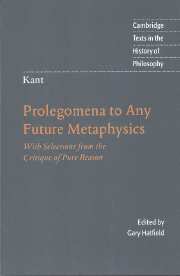Book contents
- Frontmatter
- Contents
- Acknowledgments
- Introduction
- Chronology
- Further reading
- Note on texts and translation
- Prolegomena to Any Future Metaphysics
- Table of Contents
- Preface
- Preamble
- General Question of the Prolegomena
- General Question
- The Main Transcendental Question, First Part
- The Main Transcendental Question, Second Part
- The Main Transcendental Question, Third Part
- Solution to the General Question of the Prolegomena
- Appendix
- Selections from the Critique of Pure Reason
- Index
- Cambridge texts in the history of philosophy
The Main Transcendental Question, First Part
Published online by Cambridge University Press: 05 June 2012
- Frontmatter
- Contents
- Acknowledgments
- Introduction
- Chronology
- Further reading
- Note on texts and translation
- Prolegomena to Any Future Metaphysics
- Table of Contents
- Preface
- Preamble
- General Question of the Prolegomena
- General Question
- The Main Transcendental Question, First Part
- The Main Transcendental Question, Second Part
- The Main Transcendental Question, Third Part
- Solution to the General Question of the Prolegomena
- Appendix
- Selections from the Critique of Pure Reason
- Index
- Cambridge texts in the history of philosophy
Summary
Here now is a great and proven body of cognition, which is already of admirable extent and promises unlimited expansion in the future, which carries with it thoroughly apodictic certainty (i.e., absolute necessity), hence rests on no grounds of experience, and so is a pure product of reason, but beyond this is thoroughly synthetic. “How is it possible then for human reason to achieve such cognition wholly a priori?” Does not this capacity, since it is not, and cannot be, based on experience, presuppose some a priori basis for cognition, which lies deeply hidden, but which might reveal itself through these its effects, if their first beginnings were only diligently tracked down?
We find, however, that all mathematical cognition has this distinguishing feature, that it must present its concept beforehand in intuition and indeed a priori, consequently in an intuition that is not empirical but pure, without which means it cannot take a single step; therefore its judgments are always intuitive, in the place of which philosophy can content itself with discursive judgments from mere concepts, and can indeed exemplify its apodictic teachings through intuition but can never derive them from it. This observation with respect to the nature of mathematics already guides us toward the first and highest condition of its possibility; namely, it must be grounded in some pure intuition or other, in which it can present, or, as one calls it, construct all of its concepts in concreto yet a priori.
- Type
- Chapter
- Information
- Kant: Prolegomena to Any Future MetaphysicsWith Selections from the Critique of Pure Reason, pp. 32 - 46Publisher: Cambridge University PressPrint publication year: 1997



